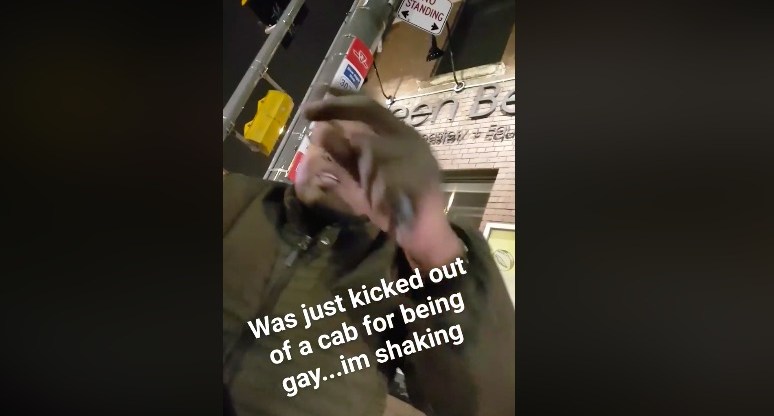Gay man says he was kicked out of taxi after mentioning his boyfriend

A Canadian man has said a taxi driver told him to get out of the vehicle after he mentioned his boyfriend during their conversation.
Toronto resident Travis Paul, a musical theatre performer, had hailed a taxi to take him home after a drinking with friends on Thursday (November 1) but his journey home came to an abrupt halt when the driver stopped by the side of the road, telling him to leave the car.
“When the driver heard me use the word ‘boyfriend’ in conversation he slyly pulled over at a destination that was not mine and quickly tried to put me in another cab,” Paul said in a written statement to PinkNews.
Paul then began questioning the driver about his motives, filming the exchange on his phone. “I started filming as soon as he got out of the car because I realized I needed the witness,” he explained.
He then uploaded the video on Facebook, captioned with the words “Was just kicked out of a cab for being gay… I’m shaking.”
In the video, Paul can be heard confronting the driver, who is clearly visible on camera, about his decision.
“We’re not comfortable, my friend,” the driver said at first, vaguely mentioning “The conversation you had with me, everything,” before refusing to elucidate the cause of his discomfort any further.
“Why won’t you drive me home, because I’m gay?” Paul can be heard asking. “I did not say that,” the driver answered.
The video lasts around three and a half minutes, in which Paul repeatedly asks for an explanation for the driver’s behaviour, and the driver eventually appears to be calling the police shortly before the recording ends.
Paul explained: “I figured if he wasn’t waiting around for the police, then they probably weren’t coming. I’m certain it was a 911 operator he was talking to in the last part of the video, you can hear the lady ask what his emergency is.”
“The driver is trying to explain to police services what is going on but all he can say is that I am harassing him and calling him abusive. When I’m on the other side of the car I hear him use the words ‘gay man.'”
In the video, Paul reacted upon hearing that, saying: “What did you just say… I’m a gay man? You are in trouble now. You don’t say that, not in Canada.”

People cross at the intersection in Toronto, Canada. (Cole Burston/Getty)
The video he filmed was watched more than 35,000 times, shared nearly 400 times, and received dozens of comments, mostly sympathetic to Paul’s ordeal.
Canadian news channel CTV news says the City of Toronto is investigating the video. “The conversation has been very mutual and I’m proud of the City of Toronto for their attention to this case,” Paul said, calling the outpouring of support “tremendous.”
Paul said he had issues with taxi drivers over rides that were too short or card payments that did not work, but that this exchange had a clearly discriminatory intent.
“I was immediately scared, I knew something was up. I’m the kind of guy who doesn’t hold his boyfriend’s hand down the street, cause I can’t stop myself from thinking what other people are thinking. Sometimes I think I pitch my voice lower than I need to, or make sure I don’t talk too much with my hands. This is the discrimination and harassment we have all grown to know in this world,” he said.
“I’m at a point now where I can’t stay quiet about these injustices anymore. I’m learning how to love myself and im learning how to fight for that,” he added: “This still happens every day… To minorities of all types and it’s ruthless, it’s vicious, it’s hateful and disgusting and there’s no place for it here in Canada.. There should be no place for it anywhere in the world.”
Addressing some of the comments to the video, which made assumptions about the driver’s ethnicity and religion, Paul said: “It’s sad to see people fight fire with fire, That’s not the way to solve an injustice. We must first be vulnerable, we must first listen and not blame.”
This article was updated with a comment received after publication.

